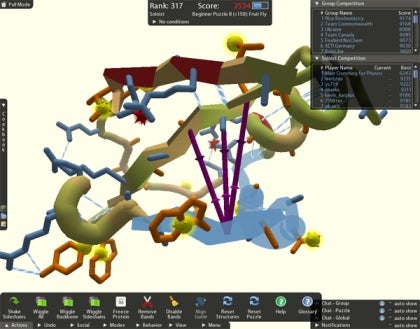On July 22nd, President Kim addressed the International AIDS Conference for the first time as President of the World Bank Group. One of the main themes of the conference this year was the launch of "Towards an HIV Cure”, which made me reflect on the break through achievement made in 2011 by “online gamers” that revealed the structure of an enzyme that could be used to help fight HIV and AIDS. Though, I am certainly not an expert on the subject, it is evident that combating HIV/AIDS remains one of the greatest challenges of our generation. Some researchers say that the possibility of finding a cure is at best 50%.[1] What if we can increase that possibility by leveraging the power of “gamification”. Can online gaming be a game-changing method for finding solutions to global problems that are currently considered “unsolvable”?
What is this whole hype about gamification? Taken from wikipedia gamification is “the infusion of game design techniques and game mechanics to solve problems and engage audiences”. Last year, in just three weeks, 46,000 online gamers (some even in middle school) cracked the secret of a key protein that scientists believe may help them cure HIV – a research that had been puzzling the scientists for over 15 years. This was done through an online puzzle video game called “Foldit”, which was developed by the University of Washington, and is a platform dedicated to solving important scientific research for eradicating diseases, and creating biological innovations. [2] You can see a video on Foldit here. Below is a screenshot from the game.

Source: Discover Magazine Blog
According to Gartner, this emerging discipline is growing dramatically and by 2014 more than 70% of the world’s biggest companies will be actively using gamification.[3]In fact, there has already been an exciting gamification World Bank initiative led by WBI and InfoDev leveraging on this concept. EVOKE was launched in 2010 as a multi-player online game that supports social innovation among young people around the world. In its first 10 weeks, EVOKE evolved into a global knowledge platform that engaged nearly 20,000 players from over 150 countries “gaming” to tackle development challenges ranging from food security to urban resilience to indigenous knowledge. At the end of the game, 74 project ideas (known as 'evokations') were submitted. Given its success, in 2011, EVOKE was nominated for a Katerva Award in Sustainability.
Building on the success and momentum, how can we create a sustainable platform that could tap into these highly motivated gamers community (including our very own WBG gamers!) to contribute to solving some of the most challenging global issues? In addition to the search for a cure for HIV/AIDS, what are the areas that could most benefit from the concept of gamification? Gamification is not just about monetary rewards (though it can also be a powerful platform for microwork) but is also about motivating people to serve a meaningful purpose and triggering intrinsic satisfaction. In fact, there are numerous debates about gamification’s alignment with theories of human motivation. For sure, the World Bank mission of eradicating poverty intrigues the motivation of many. However, it is important that challenging but specific problems and concrete goals are defined in order to maximize the impact of this continuing hype. There is no doubt that gamification can be one of the most exciting and break through collaboration of technology and humans in our search for solutions to improve the lives of the poor and the most vulnerable.
[1] http://www.cnn.com/2012/07/23/health/hiv-aids-conference/index.html?iref=allsearch
[2] http://blogs.discovermagazine.com/notrocketscience/2011/09/18/computer-gamers-solve-problem-in-aids-research-that-puzzled-scientists-for-years/


Join the Conversation